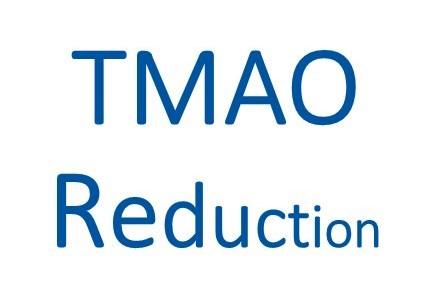TMAO Reduction Through Diet and Probiotics

TMAO reduction may be a worthwhile target for better health. If you have not read the pages on TMAU, Trimethylaminuria, and Probiotics and TMAO, I suggest you read those first for background perspective.
Recall that TMAO is an acronym for trimethylamine-N-oxide and it is considered to be one of the gut-derived uremic toxins (GDUT's). Studies link TMAO to cardiovascular disease, kidney disease, neurological disorders and some cancers, so strategies for decreasing it are worthwhile.
The Mediterranean Diet
You have probably heard good things about the Mediterranean diet (Med
diet). What's not to love with its whole foods filled with plenty of
fiber, vitamins, minerals, healthy fats and antioxidants? The Med diet
is an eating plan focused on plant foods with: a high intake of
vegetables, fruits, nuts, seeds, beans, tubers like sweet potatoes, peas
and lentils, and herbs and spices; moderate amounts of whole grains,
optional red wine, avocados and olive oil; and small amounts of cheese,
yogurt, eggs and animal flesh (fish, poultry) from non-red meat. Red
meat is seldom consumed. Processed and refined foods are avoided.
Although
the details on what exactly a Med diet is may differ depending on who
you talk to and which part of the Mediterranean region is considered,
the basic premise is that the focus is on whole foods. The Med lifestyle
includes regular physical activity, sharing meals and enjoyment of life
in addition to the diet. In fact, the Mediterranean Diet Pyramid shows
physical activity and enjoying time with others as the base of the
pyramid.
According to the latest from the Mayo Clinic, the Med
diet reduces the risk of heart disease, and reduces the incidences of
cancer, Parkinson’s and Alzheimer’s diseases. A US News and World Report
expert panel ranked the Med diet in 2018 as tied with the DASH diet for
the best diet overall and the best diet for healthy eating, plus it was
ranked as the best diabetes diet, the best plant-based diet, and the
easiest diet to follow, out of 40 diets.
TMAO Reduction Through Diet
A 2016 study by De Fillippis et al. showed that strict adherence to a Med diet verified by daily diet diaries for seven days resulted in beneficial gut microbiome changes and lower urinary TMAO levels, whereas low adherence resulted in higher urinary TMAO levels.
But wait, doesn't the Med diet contain fish and other foods that contain TMA precursors? Yes, in fact, it does, even the focus is mostly on plant foods. The TMA precursors are only part of the TMAU and TMAO reduction story. The gut microbiome is another important part.
In contrast, in a 2018 study, researchers looked at 276 patients from cardiovascular-disease prevention clinics in Canada and all patients were advised at their first visit and follow-up visits to consume the Med diet. The study outcomes were:
- The effects of the Med diet on GDUT’s
- The level of renal (kidney) function compared with plasma levels of the GDUT’s
- The carotid plaque burden in relation to plasma levels of GDUT’s and the level of adherence to the Med diet.
This study did not use daily diet diaries and instead relied on a questionnaire of perceived intake of different foods over a one-year period. Although this questionnaire is supposed to be a validated method of reporting intake, I personally find that people overestimate the healthy foods they eat and underestimate the unhealthy ones. I cannot recall what I actually ate last week, not to mention throughout the year!
The study found that very, very few patients (3 out of 276) actually had strict adherence to the Med diet. Nonetheless, GDUT's such as TMAO in the participants were significantly associated with higher carotid artery plaque burdens.
The researchers did not find any association between GDUT's and how well a person followed the Med diet, nor specific food amounts that contribute to GDUT's. This was probably due to the limitations of the study including that:
- Practically none of the participants followed the diet closely, as mentioned
- Actual foods per day were not recorded
- Vegans were not included
- No physical activity was tracked
- There was no crossover from a standard diet to the Med diet
- The time periods on the diet varied
- Carotid plaque burden was not investigated over time
- Blood tests were not taken after patients ate certain foods
Researchers also did not find a significant relationship between the Med diet and carotid artery plaque burden. Again, the aforementioned limitations of the study probably affected the relationship.
Instead, the researchers suggested that approaches other than diet, such as probiotics and repopulation of the intestinal microbiome, may be necessary for decreasing GDUT's such as TMAO reduction. Despite the limitations of the study, the latter part of this conclusion may have merit.
TMAO Reduction Through Gut Health
While the 2018 study mentioned above may cause you to think that diet has no effect on the production of GDUT's and that all you have to do is take probiotics and/or get a fecal transplant, you would be mistaken if you dismissed diet.
Diet affects the gut microbiome and TMAO reduction, as the 2016 study showed. It is an established fact that diet can affect the gut microbiome within a day and that the gut microbiome affects gut health and overall health. Taking probiotics or having a fecal transplant as isolated therapies without diet and lifestyle considerations will fail.
It is also known that probiotics, by definition, when taken in adequate amounts confer a health benefit to you. Since probiotics are in a constant struggle with the pathogens and opportunists in your gut and need help to survive and thrive, you can give them an advantage through your diet and lifestyle choices. For more information on that, see Probiotics: How to Use Them to Your Advantage.
Diet also affects gut health via mechanisms not directly related to gut microbiota. Unhealthy additives in processed foods not only do not support the health of the intestines, but they can directly damage intestinal cells and cause undesirable epigenetic changes which favor inflammation.
Whether you choose the Med diet or another diet for TMAO reduction, the central theme should be to provide your body with nourishing real foods and probiotics and include them as part of an overall healthy lifestyle.
For more research on gut health and the Mediterranean diet, please see this page.
Return to Trimethylaminuria page.
Return to Health Benefits page.
Return to Homepage.
I research studies and share my clinical experience to write this free site to help you find solutions to your problems. As part of that, I recommend products and services that I genuinely believe will be of help to you. If you click on a link to a product/service, I may receive a small commission to support my efforts if you buy something. The item does not cost you more.
Thanks for visiting this site! If you've enjoyed reading this page or have found the information to be useful to you, please "like", tweet about it, or share it so others can benefit, too. You can leave comments below via Facebook or Disqus.
Comment with Disqus (including as a guest), Twitter or Google accounts:
If you are one of my many readers without a Facebook account, you can still comment.
Disclaimer: Please note: By law, I cannot provide any personalized recommendations for your specific health concern on this site. The information contained in this site is educational in nature and is not intended as diagnosis, treatment, prescription or cure for any physical or mental disease, nor is it intended as a substitute for regular medical care. Consult with your doctor regarding any health or medical concerns you may have.
Subscribe to my monthly newsletter and receive a free copy of "How to Use Probiotics to Lose Weight and Be Healthier".

To comply with the EU's GDPR data privacy regulation, please subscribe here:
Looking for some quality professional supplements, including probiotics? Check out my online dispensary, as I will be doing reviews of some of these products in the future. Click on the Fullscript picture. (Note: If you were a former Wellevate customer, please switch to Fullscript for a better customer experience. Thanks!)
Some competitors of SBI (Solo Build It) are posting fake negative reviews of SBI. If you are considering creating your own website business, or if you have a brick-and-mortar business but want an online presence, I highly recommend SBI!





Comment with Facebook!
I'd love to hear your opinion about what you just read. Leave me a comment in the box below! Other commenting options follow the Facebook comments.